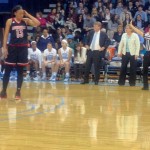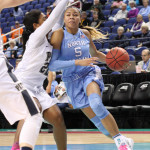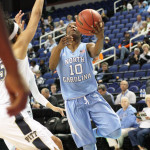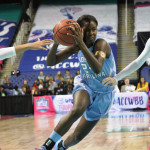
CHAPEL HILL, N.C. – For anyone who is not sure, North Carolina Tar Heels women’s basketball head coach Sylvia Hatchell is back and working at the energetic pace she has been throughout her career.
She’s a fighter and one who is cancer-free.
“If I’m not a 100 percent, I’m close to it,” Hatchell said to me last week during a one-on-one phone interview.
“I’m back and I’m doing everything I’ve ever done before.”
The initial topic of conversation was Hatchell’s new book, Fight! Fight!: Discovering Your Inner Strength When Blindsided by Life which as of last Thursday had reached the top of Amazon’s list for new books on the topic of cancer.
If you’ve read the book, continue on, but if you haven’t, get a copy and read it, and then come back.
Or, read on and piece it together when you finally turn its pages.
It will all make better sense and relay the message she’s put out – to fight.
“It can apply to anything – cancer, to fight for survival, or anything else,” Hatchell said.
“Being a coach, I know all the great things coaching has done for me, it helped me get through the worst type of leukemia you can have. There aren’t hardly any (survivors). There’s very few people that have ever survived Acute Myeloid Leukemia (AML). I wanted to do something to help other people when they go through something like that.”
The coach keeps copies close by, even while traveling on the road to share with those closest to her as well as part of book signings she is currently doing on a regular basis.
When traveling to Oregon recently, she made sure that Nike’s founder got an advance copy to read and share.
“I gave one to Phil Knight,” Hatchell said.
“He gave me his new book, Shoe Dog, and I gave him a copy of my book.”
While her book chronicles her diagnosis and treatment of AML beginning in October 2013, it also fills in gaps for what happened with her Tar Heels team throughout the 2013-2014 season.
The lengthy conversation we had filled in those gaps even more on topics she touched on in the book including player transfers and the NCAA Notice of Allegations which the University of North Carolina has been dealing with in recent years.
With a highly-touted freshman class led by Diamond DeShields coming in, Hatchell was excited for that 2013-2014 season, particularly after being inducted into the Naismith Hall of Fame that September.
Early in October she received her diagnosis and was required to start chemotherapy so quickly that she was challenged to tell her husband and son and close friends, and her coaching staff and players, all in a matter of days.
Obviously, it was challenging enough to let those close to her know, but it wasn’t the way she wanted to start a relationship with such a young and new group whose focus was to play basketball at North Carolina.
“It all happened so fast,” she said.
“Friday I was with them at practice – on the court. Saturday was our day off and then Sunday we were supposed to have practice at four o’clock and I had to tell them that I have leukemia and I’d be out a while. I had a mask on and I couldn’t get close to them, I couldn’t touch them. It’s such a part of a relationship to be able to communicate with people, and I could not get close to them. It was like there was a glass wall between us. We could look at each other and talk, but the cancer was in between us.”
“The players didn’t know what to say; they were in shock,” Hatchell continued.
“I tried to say, ‘guys we’re gonna be okay. I’ve got a great staff you’re gonna be fine’.”
While she offered her reassuring words and kept a daily oversight of the team by watching practices on an IPad and regularly communicating with longtime associate head coach Andrew Calder who led the team during the season, the inability to be close was frustrating for Hatchell.
“It was so hard,” she said while describing her attendance at her first game in January 2014.
Though able to watch, her treatment still required her to keep minimal contact with anyone.
“It was like I was in a cloud over the arena watching the game. All I could do is wave down to them. That was torture for me. For them it was like ‘there’s Coach Hatchell, but’… I was a part of them, but I could not be effective. I couldn’t be a part of things.”
She kept touch with the players via texts and phone calls which helped fill the void a little, but it wasn’t the optimal situation, particularly in dealing with millennial generation players.
“You know how everything is – so much is about now”, Hatchell said.
“That is what they were expecting. That would be difficult for any team and any coach. Yet, it was something I could not control. They were pretty good throughout the whole thing though. They were really good with me. They were always real positive and uplifting, saying ‘we’re playing for you coach’. My world for years at that point in the year was about basketball, but here I was fighting for my life.”
Having gone through the aggressive treatment and exercise regimen that she did, Hatchell’s quick remission was a positive sign, and a motivating one to her.
“I have come back with more passion than ever,” Hatchell said.
“I wanna keep coaching. I love the sport, I love the players, and I feel like those kids need me now, more than ever. Just because of how our world is now. You don’t realize how much you love something until it’s taken away like that. It made me tougher, it made me love it even more. It really motivated me to do the treatments, exercise, and get back out there. And I wanted to be back out there.”
Her young and talented team admired the strength and resilience that she showed, but unfortunately, even following a postseason run that ended in the Elite 8 round in the NCAA Tournament, four players – Diamond DeShields, Jessica Washington, Allisha Gray and Stephanie Mavunga – eventually transferred.
Not necessarily due to Hatchell’s sickness, but due to a variety of factors which she elaborated on.
“I feel like my cancer had very little to do with all that, to be honest with you,” Hatchell said.
“That year with those freshmen, if I had been able to be there like I had planned, would the relationships have been stronger? Probably so…The bulk of the transfers have been for other reasons.
“I think outside influences at the beginning with Diamond,” she continued.
“I think it was outside influences that pretty much had to do with that. The other ones were the NCAA thing. Jessica Washington was different – that was a disciplinary thing. I did not renew her scholarship, and that was because of some disciplinary situations that happened. The other two (Mavunga, Gray) did not want to leave. Their parents made them leave because they panicked over the NCAA thing.”
With so many transfers taking place in women’s basketball overall, not just at North Carolina, I asked Hatchell what the reasoning was for so much of it taking place in the game today.
“I think kids wanna play right away,” she said.
“I think a lot of outside influences, whether it’s family or AAU coaches, have an impact.”
Hatchell cited some statistics she had seen that indicated that over the past year, transfers in NCAA men’s basketball and women’ s basketball was not in double-digits, but high triple-digit ranges.
“This year, two or three programs have had six or eight kids transfer, so it’s like an epidemic out there,” Hatchell said.
“I really don’t know why it is, I really don’t know. But the kids just need to stay somewhere, and stick it out. In our situation, one was disciplinary, one was outside influences, and the other two were the parents concerned about the NCAA situation. In three of four of those (transfer) situations, I had kids in my office crying because they didn’t want to leave.”
Were there regrets from some of them?
According to Hatchell there were.
“I’ve heard things that those kids said after they were forced to leave for different reasons; ‘Coach Hatchell, I should have stayed at North Carolina’. I have had some of them say they should have stayed at North Carolina. You know, the grass is not always greener…I don’t know why kids are transferring like they are now. A lot of it is millennials and instant gratification. There are a lot of coaches out there asking that question. The fact that we’ve gone through what we’ve gone through, I think that is behind us and we’re moving in the right direction.”
Instead of players transferring out of the program, Hatchell and her staff are focusing on those coming in.
She’s making sure to let it be known that she’s the right coach leading the right program for them.
“I’m back. I’m as strong as ever and I’m as passionate as ever,” she stated emphatically.
“We’ve got a tremendous recruiting class. I think this coming year we’re gonna be good. We’re young, but we’re gonna be good. I think we’re back on our way in being back in the thick of things. We’ll be back in the thick of things.”
Outside influences and an NCAA investigation aren’t deterring her from her job – to coach women’s basketball at North Carolina.
“That doesn’t change how the game’s played, our passion for the game, and opportunities,” Hatchell said.
“One of the reasons I wanna keep coaching is the passion I have for it. I feel the kids need me more now, more than ever because of the experience and the success I have had. I wanna share that with them, I wanna spread that, and I wanna share with them how to be successful, and how to be tough through tough times. You don’t quit, you don’t give up, and you don’t bailout. You’re tough, you endure, you’re loyal, and you tough things out. You’re gonna be better for it. In the long run, it’s gonna be the best thing.
I feel like I’ve got a lot that I can teach players now in their lives that they’ve never experienced. I can help them mature and grow. We’ve got a great group comin’ in, I’m healthy, and our future’s good. We’ve got a lot of good young players. I’m excited about our future because I think we’ve weathered the storm and there’s nothin’ but greatness in front of us.”
If you’ve watched and listened and talked with this coach long enough, you will never see her flinch at a challenge or back down from answering to it.
She continued on to document that point.
It wasn’t necessarily spin, but she made the point numerous times that Tar Heels women’s basketball will continue on to return to the perch that it once rested upon.
“Last summer when those kids left, it put us in a tough situation,” Hatchell said.
“In the last three years we’ve gone to an Elite 8, a Sweet 16, and now this past year was the first time we’ve had a losing season in 20 years, but like I said, we’ll be back in the thick of things next year. Some of these freshmen are gonna be really good, and we’ve got a really strong core coming back.”
Not only will the Tar Heels fight to earn their respect back on the court, but off of it as well.
UNC’s Notice of Allegations may actually be finally decided upon at some point during the season.
It’s a touchy issue for Hatchell, and one she referenced openly in her book in a variety of instances.
She talked candidly about it and in more detail during our conversation.
Though she said she chose the first two words in her book title (Fight! Fight!) as reference to the UNC fight song, reading between the lines to me indicated how she felt about the entire NCAA situation and the negative light it has shed on her program.
“Whenever you’re in a situation where you’re not guilty and you haven’t done anything…the (NCAA) allegations – this is an academic issue,” she stated emphatically.
“People just don’t want to say, ‘Hey, there’s nothing against Coach Hatchell or women’s basketball’. There’s nothing. It’s an academic situation. My players were the student-athletes who were being advised by the academic side. It’s an academic issue. There is nothing against the coaches or against women’s basketball. It’s strictly an academic situation. Yet are we being the victims?”
Hatchell paused briefly and then simply stated the way she’ll continue to deal with the situation as it continues to hover over the program.
“Hey, you know what? I handled acute myeloid leukemia; I can handle this,” she said.
“I’m looking forward to the future and all I can do is trust that the NCAA and the University will do the right thing – that they will look at the situation and do the right thing. I have faith in them – the University and the NCAA – that they will do the right thing here. There are no allegations against me, the coaches, or anything to do with women’s basketball. It is an academic situation.”
Yes, she’s dealing with the present, but moving on.
“We’ve got great kids here now, and we’ve got things lined up for the future, and I’m healthy as a horse – I’m good to go,” Hatchell said.
“I don’t look back, I look forward – I don’t look behind me, I look forward. But, I will always fight for what is right. I will always fight for what is right and to do the right thing. I will always do that. That’s part of life. Things like that happen in life. But again, you gotta stand up for the right things. I want my players to see me live that each and every day. I want my players to see me live that, and learn how to do it as they live their lives. That’s what we’re gonna do.”
The final few points she made were ones that no one can dispute her on, and if they do, will be hard pressed to get a different response from her otherwise.
“People don’t understand what I’ve been through,” she concluded.
“But hey, with what I’ve been through, I can handle anything. And I feel like I can. Whether it’s fair or not, or whatever. I feel I can handle it because I don’t think there’s worse to get through than what I went through…I love the University of North Carolina. I don’t want anyone to ever question my loyalty and how much I love this University. I love this University, the people here, and I will always fight for the University of North Carolina – always.”




